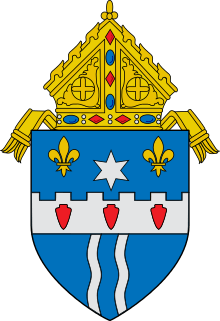Thomas Joseph McDonough
| The Most Reverend Thomas Joseph McDonough | |
|---|---|
| Archbishop of Louisville | |
| See | Louisville |
| Installed | May 2, 1967 |
| Term ended | September 29, 1981 |
| Predecessor | John A. Floersh |
| Successor | Thomas C. Kelly, O.P. |
| Other posts |
Auxiliary Bishop of St. Augustine (1947-1957) Auxiliary Bishop of Savannah (1957-1960) Bishop of Savannah (1960-1967) |
| Orders | |
| Ordination | May 26, 1938 |
| Consecration | April 30, 1947 |
| Personal details | |
| Born |
December 5, 1911 Philadelphia, Pennsylvania |
| Died |
August 4, 1998 (aged 86) Darby, Pennsylvania |
Thomas Joseph McDonough (December 5, 1911 – August 4, 1998) was an American prelate of the Roman Catholic Church. He served as the bishop of the Diocese of Savannah, Georgia (1960–1967) and as Archbishop of the Archdiocese of Louisville, Kentucky (1967–1981).
Biography
Early life and ministry
McDonough was born in Philadelphia, Pennsylvania, to Michael Francis and Mary Margaret (Nolan) McDonough. After graduating from West Philadelphia Catholic High School, he studied at St. Charles Borromeo Seminary. He was ordained to the priesthood by Bishop Hugh L. Lamb on May 26, 1938.[1] In 1941 he earned a Doctor of Canon Law from The Catholic University of America in Washington, D.C. He was transferred to the Diocese of St. Augustine in Florida, where he served as pastor of St. Joseph's Church in Loretto (1942–1943) and rector of the Cathedral of St. Augustine (1943–1945).[2] He also served as chancellor (1944–1947) and vicar general (1947–1957) of the diocese.[3]
Auxiliary Bishop of St. Augustine
On March 10, 1947, McDonough was appointed Auxiliary Bishop of the Diocese of St. Augustine, Florida and Titular Bishop of Thenae by Pope Pius XII.[1] He received his episcopal consecration on the following April 30 from Cardinal Dennis Joseph Dougherty, with Bishops Emmet M. Walsh and Joseph Carroll McCormick serving as co-consecrators.[1] At age 35, he was then the youngest member of the American hierarchy.[3] During his tenure as an auxiliary, he was responsible for a great deal of land purchasing, fund-raising and church building, and worked with African Americans.[3]
Bishop of Savannah
McDonough was named Auxiliary Bishop of Savannah, Georgia, on January 2, 1957, and later succeeded Bishop Gerald O'Hara as the tenth Bishop of Savannah on March 2, 1960.[3] He attended the Second Vatican Council from 1962 to 1965, and signed the pioneering civil rights "Pentecost Statement" of the bishops of the Atlanta Province, condemning racial discrimination as contrary to Christian principles.[4]
Archbishop of Louisville
Pope Paul VI promoted McDonough to Archbishop of Louisville, Kentucky, on March 1, 1967.[1] A self-described "Vatican II bishop," he implemented the Council's reforms and guided the Archdiocese through an intensive period of activity and change.[5] His tenure saw advances made in liturgical renewal, ecumenism, and lay involvement.[6] After fourteen years as Archbishop, he resigned on September 29, 1981.[1]
Reaction to Roe v. Wade
On January 22, 1973, when the Supreme Court issued the Roe v. Wade decision legalizing abortion, McDonough issued a statement calling the day "Blue Monday" and saying that it was "overtly a violation of individual rights. It comes at a time too when efforts have been made to close down the war in Vietnam and to save the lives of all the people who have been endangered by that war. Now we hear the highest court in the land has declared an assault upon the life of the unborn child."[7]
Death
McDonough died in Darby, Pennsylvania, aged 86.[8] He is buried at Calvary Cemetery in Louisville.[9]
See also
References
- 1 2 3 4 5 "Archbishop Thomas Joseph McDonough". Catholic-Hierarchy.org.
- ↑ "The Diocese of St. Augustine: 1870-2005" (PDF). The Florida Catholic Heritage Trail.
- 1 2 3 4 "Bishop Thomas Joseph McDonough (Auxiliary: 1947-1957)". Roman Catholic Diocese of St. Augustine.
- ↑ "Pentecost Statement Issued By Bishops In Atlanta Province". The Georgia Bulletin. 1965-06-03.
- ↑ "Brief History of the Archdiocese of Louisville". Roman Catholic Archdiocese of Louisville.
- ↑ Kleber, John E. The Encyclopedia of Louisville. Missing or empty
|title=(help) - ↑ "Bicentennial Bulletin Blurbs for 2008". Roman Catholic Archdiocese of Louisville.
- ↑ "Bishops of the Archdiocese of Louisville". Roman Catholic Archdiocese of Louisville.
- ↑ "Calvary Cemetery". Roman Catholic Archdiocese of Louisville.
External links
- Roman Catholic Archdiocese of Louisville
- Roman Catholic Diocese of Savannah
- Roman Catholic Diocese of St. Augustine
| Catholic Church titles | ||
|---|---|---|
| Preceded by – |
Auxiliary Bishop of St. Augustine 1947–1957 |
Succeeded by – |
| Preceded by – |
Auxiliary Bishop of Savannah 1957–1960 |
Succeeded by – |
| Preceded by Gerald Patrick Aloysius O'Hara |
Bishop of Savannah 1960–1967 |
Succeeded by Gerard Louis Frey |
| Preceded by John A. Floersh |
Archbishop of Louisville 1967–1981 |
Succeeded by Thomas C. Kelly, O.P. |
| |||||||||||||||||||||
| |||||||||||||||||||||
| |||||||||||||||||||||||||||||
|



